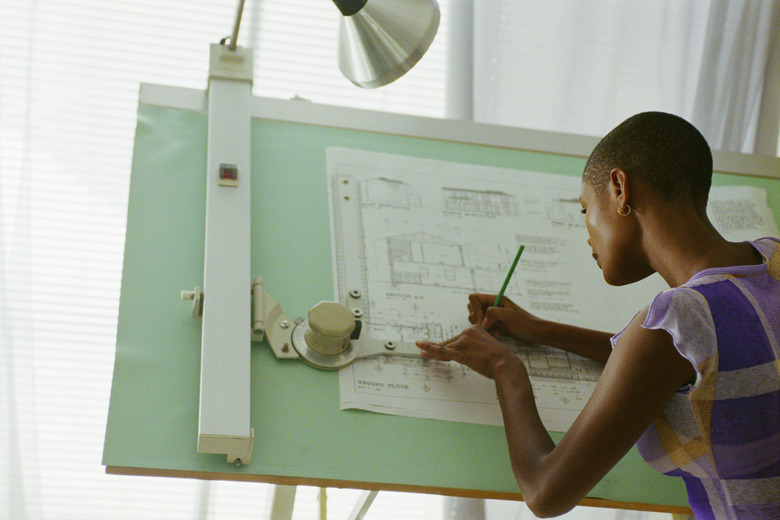What You Need To Know Before You Hire An Architect For Your Home Remodel
We may receive a commission on purchases made from links.
As you enter the design process for your remodel or new home, you may be tempted to wing it by making all the major decisions yourself. That's your prerogative, but before you do so, ask yourself these questions: Am I familiar with all the building codes that apply to the project? Do I know enough about available materials to avoid overspending? Do I trust myself to make savvy design choices based on current trends? Will I be able to efficiently coordinate all the workers who will be needed to build or remodel my dream home?
Chances are slim that most homeowners can answer yes to these and similar questions and will need some kind of professional help, and an architect tops the list of pros they should call. Besides helping to clarify ideas and commit them to an actionable plan, a good architect understands materials, codes, and construction processes. A really good architect has connections to the best contractors in the area, and a really, really good architect has a keen sense of style and performs active oversight throughout the building process to keep the project on track and ensure that clients love the final results.
Whether you're ready to build on a plot of land, tear down your house and rebuild, or just add an extra story to your existing house, it's the architect's job to help you convert your dreams to three-dimensional reality. For this, you want a relatable person who understands your dreams but is firmly grounded in the real world, and that kind of talent isn't cheap. Hiring a good architect adds a considerable amount onto the cost of the project, but you'll streamline the design process and could end up with results you didn't think possible while potentially even saving money by avoiding costly mistakes.
Ready to hire an architect for your next big project? Here's what you need to know.
What an Architect Does
What an Architect Does
The word "architect' comes from the ancient Greek and loosely means "chief builder," and until about the 16th century, when paper and pencils became widely available, an architect served the dual functions of designing and building. These days, the architect is mostly concerned with the design process and leaves the hands-on work to other contractors, but it's part of an architect's job to get involved with certain aspects of the building process to some degree, especially those who work in design-build firms that also employ contractors.
The job of an architect as it pertains to homeowners seeking to undertake a remodel or new construction typically involves:
- Meeting with clients to determine their needs and consult about design options.
- Managing the design process from conceptualization to completion, adjusting the design and floor plan throughout the project to meet clients' needs.
- Preparing blueprints, materials lists, and other drawings and documents needed during the construction process.
- Researching and compiling reports on feasibility, environmental impact, and local planning issues, including building code and zoning requirements.
- Determining budget and time frame and managing project teams.
When contracting with a large architectural firm, homeowners may have occasion to work with more than one type of architect. Design architects are primarily concerned with the design process, while technical architects are the ones who produce construction drawings and participate in the construction process. Architects who work on smaller residential projects are often design-build professionals who combine these roles. Interior design and landscape architects are specialized professionals who perform specific jobs.
Doing Your Homework
Doing Your Homework
Working with an architectural firm is a long-term commitment, considering that the time frame for most projects is usually measured in months and years, and projects have a habit of getting modified over such long periods. The more clearly homeowners are able to conceptualize their ideas before consulting with an architect, the more likely it is that the final results will match them. This may mean reading design magazines or searching design sites online, consulting with local builders about permitting requirements in the area, and researching appropriate home heating, cooling, and energy technology in advance.
The right architect will walk you through potential problems during the design process, and consultation will be more fruitful if you've thought of potential alternatives to your preferred designs beforehand. For example, your consultation may reveal that your existing home's foundation can't support the extra story you want, and if so, it will be easier to move on to the discussion of a ground floor room addition if you've already done enough preliminary research to determine that it's feasible.
A licensed architect typically offers a free rudimentary initial consultation but begins charging as soon as the design process begins, so before you get to that point, you need to have a clear idea of your budget. Don't forget that from the time the design process starts, you have to add the architect's fees to the project cost. Architects are trained to look for ways to modify designs and trim materials costs to stay within budget limits, but they have to know the budget parameters to do this job effectively, so be clear about it from the outset.
Architect vs. Design-Build Contractor
Architect vs. Design-Build Contractor
In addition to hiring an architect, a homeowner planning a remodel or a new custom home has the option to hire a design-builder, which is basically a general contractor or contracting firm that also offers design services. Although homeowners don't always need to turn to a professional designer when planning a bathroom or basement remodel, they generally need a contractor, and a contractor who offers design services is a bonus for small projects as well as large ones. The homeowner could end up saving money on materials while enjoying a more streamlined construction process and a superior final result.
One of the main advantages of the design-build approach over hiring an independent architect is that when it comes time to settle up, there's only one check to cut instead of two. There are other advantages as well, including:
- Better collaboration: Because the designer and builder work for the same firm, they are more likely to see eye to eye and avoid confrontations that slow down the project and create added expenses.
- Better communication: People involved with the design process are in direct touch with those involved with the construction process. That takes heat off the homeowner, who doesn't have to step in as an intermediary.
- Better speed and efficiency: Better communication means more efficiency and faster progress on the project.
On the flip side, one of the most important reasons to hire architectural firms separately from contractors is that it gives homeowners an extra set of eyes on the project. This approach includes some other benefits, including:
- Better design latitude: An architect is trained in design development, and part of that training includes familiarity with recent design trends. Trendy architects with high-level expertise are more likely to work independently, and while they usually maintain a network of contractors and subcontractors, they are unlikely to be affiliated with a single contracting company.
- Better bidding potential: Once the design process is complete, the architect together with the homeowner can open the project to bidders, and this could well result in a lower overall cost for the homeowner than if the architect passed on the work to an in-house construction team.
- Better budget oversight: Design-build firms often discuss budget matters internally and can fail to include the homeowner until the project has gone over budget, and it's too late. An independent architect is more likely to keep a homeowner in the loop when budget matters are discussed.
Questions to Ask an Architect Before Hiring
Questions to Ask an Architect Before Hiring
Good places to search for architects include the website of the American Institute of Architects (AIA), design magazines, and online home design sites. Hiring an architect is a major investment, so you'll want to interview several. Competence is assumed since all architects are rigorously trained, so compatibility, work ethic, and philosophy are some of the more important issues to explore. Some sample questions to ask your architect might be:
1. Have You Designed Projects Similar to Mine?
This question comes after you've already described the project, and it's one of the best ways to gauge compatibility. If the answer is yes, you can explore specific details that apply to your project. If the answer is no, you might want to go into questions that gauge the architect's actual interest in what you are proposing.
2. Can You Provide References?
The architect may be able to show you completed projects similar to yours or ones that incorporate design features that you find interesting. References from former clients are always useful, as they provide insight on such relevant issues as work history, timeliness, communication ability, and trustworthiness.
3. What Is Your Design Philosophy and Process?
What is the architect's main focus during the design phase? Is it sustainability, cost, aesthetics, or a combination? How does the architect move a project from design development to the construction process? Does the architect take any role in construction administration and to what degree?
4. What Are Some of Your Design Ideas?
This can be a general question to get a feel of the architect's aesthetic sensibilities when it comes to building designs and is an especially important one if you're looking for creative input for your project. You can also direct the question specifically to your project to gauge whether your design preferences mesh with those of the architect. The architect may surprise you with interesting approaches you hadn't considered.
5. What Responsibilities Will You Assume?
It's important to know what the architect will and won't do. Who will hire contractors, and when a building permit is required, whose responsibility is it to get it? If something goes wrong, who is responsible for fixing it?
6. How Long Will It Take to Produce a Plan, and How Will You Present It?
Regardless of other responsibilities the architect assumes, the main one is to produce a plan, and construction can't begin until the construction documents are available. Make sure the architect has time for the project and isn't overbooked. You'll also want to know whether plans will be shared digitally or in paper form so you can prepare to receive them in the form presented.
7. How Do You Structure Your Fees?
Architectural fees sometimes take the form of a flat fee payable on completion, some architects require partial payment up front, and some charge a percentage of the construction cost. It's important to be clear about fee structure before you sign anything.
The Cost of Hiring an Architect
The Cost of Hiring an Architect
Architects bill clients in various ways depending on the size and complexity of the projects they undertake. For a small project, such as a kitchen remodel, an architect may charge an hourly rate, and rates are typically between $60 and $125 per hour.
Flat fees are more commonly charged for larger projects, such as room additions, and they range between $2,000 and $8,500, with the average being around $5,000. Different architects may charge different rates for the same project, which is another good reason for shopping around before making a final decision.
When a large construction project is undertaken, such as a whole-house remodel or construction of a new home — particularly a custom home — architects generally charge a percentage of the construction cost, and rates between 5 and 15 percent are typical. Some architects also charge by the square foot, and still others levy fees that are a combination of an hourly rate to draw up a design followed by a fixed fee or a percentage to oversee construction. Because of the complexity of architectural fee structures, it's important to establish the payment method before signing a contract, and when a loan is needed to finance the project, the architect fees are often rolled into the loan principal.
Architect Licensing and Certification
Architect Licensing and Certification
To operate in any U.S. state, an architect needs a license, which is issued only after fulfilling minimum education requirements (a bachelor's or master's degree in architecture) and passing an exam set by the National Council of Architectural Registration Board. To maintain their license, architects usually have to earn continuing education credits, and many belong to the AIA, which supports a national network for sharing new ideas. AIA membership is a selling point when searching for an architect.
While interior architects focus on layout, lighting, and other interior design issues, landscape architects focus on landscaping. These specialty architects are usually certified by separate organizations, such as North America's Council for Interior Design Qualification or the American Society of Landscape Architects, respectively.
References
- MasterClass: What Is an Architect? Learn What Architects Do
- Washington Architectural Foundation: Why Hire an Architect
- Next: Architect License Requirements by State: A Comprehensive Guide
- MyMove: 10 Things You Need To Know Before Hiring An Architect
- California Architects Board: Becoming a Licensed Architect


